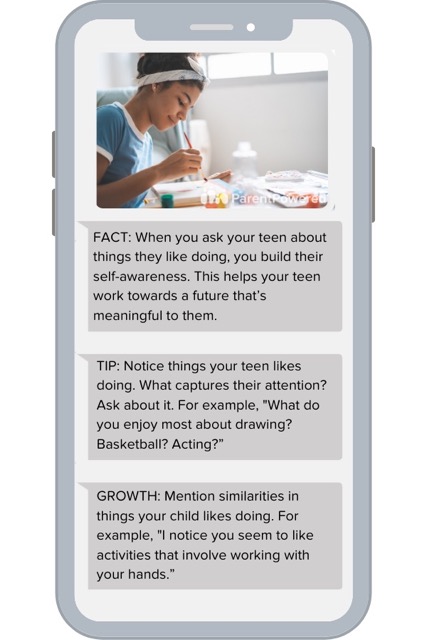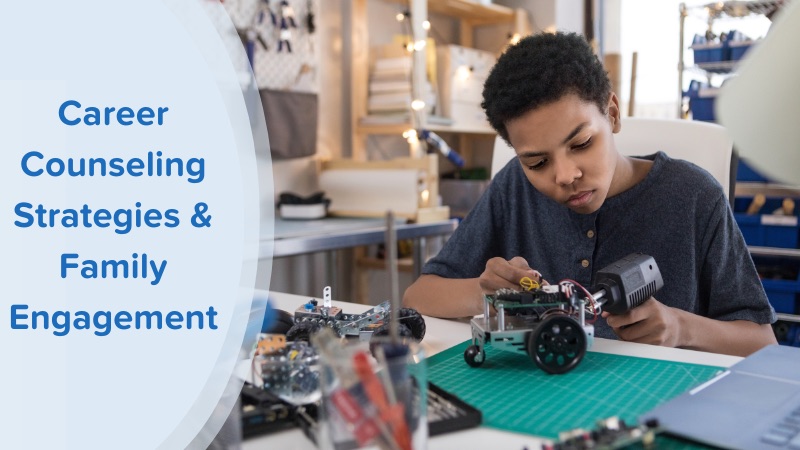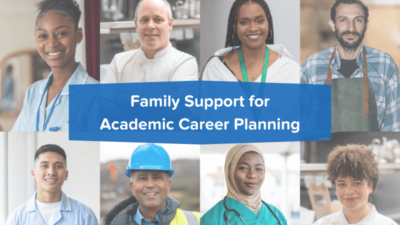By Maren Madalyn, contributing writer
Career preparedness is an increasingly high priority for many schools and districts across the U.S. At least 35 states have already implemented some form of career or college readiness standards, or otherwise launched frameworks like individual learning plans for building students’ career self-efficacy.
At the same time, educators still have more opportunities to specifically improve career readiness in high schoolers (Alliance for Excellent Education). This includes adjusting the techniques and strategies most often used by school counselors to engage students in career exploration, research, and planning more distinctly.
But no career counseling strategies are complete without the support and engagement of a high schooler’s family! When educators leverage caregivers as collaborators, they create the conditions in which high schoolers can best prepare for their career aspirations.
Career counseling: Effective strategies and approaches
When it comes to career counseling, high school counselors can leverage practices used by full-time career coaches, who support adult clients with navigating career changes or advancements.
Take a look at the table below for a quick comparison between career counseling strategies for teens vs. adults, sourced from The Walden University:
Comparing career counseling & coaching
| For Teens, School Counselors… | For Adults, Career Counselors… |
|---|---|
| Identify teens’ strengths aligned with goals for professional life or career options | Creates a therapeutic relationship with clients |
| Guide teens through self-inquiry and exploration, focused on personal interests | Define clear goals and action plans, such as improving transferable skills or gaining qualifications for a career change |
| Help teens research which type of job would engage their abilities or interests | Create space for self-inquiry and exploration; may use personality tests or psychometric assessments |
| Coach teens with basics like resume building, job search strategies, and mock interviews | Deeply understand the current job market and state of specific careers |
| Support building effective interview skills, job search skills, and more |
In the end, school counselors clearly have a major impact on a student’s college and career readiness. Counseling techniques have been shown to determine whether students elect to pursue college or other postsecondary schooling as part of their career paths (Bryan et al., 2021). Counselors also help students build self-efficacy around their motivation to complete schooling and their sense of preparedness for life after graduation, especially when counseling is paired with career pathways programming (Stipanovic et al., 2017).
Challenges with career counseling in high school
However, despite these positive impacts, school counselors may struggle with providing the level of individualized attention and support that teens need to successfully plan for a future career. The average counselor manages a caseload of over 400 high schoolers — a staggering volume that puts a lot of pressure on counselors and may result (inadvertently) in uneven offerings of career counseling strategies to students.
Further, research indicates that as a counselor’s caseload increases, the positive effects of career counseling strategies decrease for students (Bryan et al., 2021). This makes sense in the context of other studies which found that future wage earnings at age 26 increase by 0.8% for each meaningful career conversation students experience in middle and high school (OECD, 2017). It’s much harder for school counselors to spend meaningful time having such conversations with teens if they are juggling huge caseloads!
Fortunately, school counselors aren’t the only adults in a teen’s life who can help guide them through their career development process. Though often an untapped strategy, engaging with families of high schoolers can offer incredible opportunities to enhance schools’ career counseling efforts with students.

Research already shows that effective family engagement brings a wealth of benefits to the school community, including stronger K12 attendance rates, improved reading and math scores, and a positive school climate. In career planning, parents and caregivers are also well positioned to help foster adolescents’ curiosity and confidence in their career choice (Liang et al., 2020).
But it’s also important to recognize that each family arrives at school at a different starting point when it comes to career and college readiness. Further, families may have a wide range of perspectives or personal experiences related to choosing a career path — not all of which left a positive impression.
Educators that first orient their students’ caregivers to ways to support teens’ future planning set up everyone for greater success. And this is precisely what ParentPowered’s family engagement programs are designed to do!
4 tips to engage families in career exploration
ParentPowered is excited to provide high school families with easy, strengths-based, and actionable tips for supporting their teen’s learning and wellbeing. Sourced from our own family engagement curricula and additional insights from the field, these four tips will help you engage with parents and caregivers to counsel teens towards a bright future.
1. Encourage families to hold crucial conversations with teens
One of the simplest, but most effective ways a parent can help their high schooler with planning for the future is through conversations.
Communication fosters meaningful connections and is important for any relationship. The Bill & Melinda Gates Foundation discovered that missing discussions about teens’ futures may have unintended consequences on other outcomes like high school graduation.
Self reflection adds another layer to career planning for high school students. Caregivers who facilitate self reflection through conversation help their teens determine for themselves what future jobs or work opportunities may align with their strengths, interests, and long-term goals.
This approach is also developmentally appropriate; teens want (and need) to exert greater independence in making informed decisions and preparing to “adult” after high school.

ParentPowered scaffolds these crucial conversations between families and students with prompts like the one above. Access sample messages to learn how our programs grow alongside children, from birth up through grade 12.
2. Educate families on how your school prepares students for future careers
Your schools may offer incredible resources to students that guide them through career exploration and preparation — but how are you spreading the word about these opportunities?
Some families may already utilize the offerings at your school, but it’s best to assume that everyone would benefit from a refresher and repeatedly shared information about career prep resources. This ensures families of all backgrounds and life experiences understand how your school is preparing their child for the future and why engaging in these activities matters.
Keeping families in the loop about career fairs, internship opportunities, job interview practice resources, and more gives them the chance to contribute to these efforts, even in small ways. You can use these questions to first audit all the strategies your school uses to prepare teens for a future career:
- What do career counseling strategies typically look like at your school? How are you educating families about them?
- What programs do you offer related to career preparation or exploration? How can students enroll or access these programs?
- Are there specific classes that help students explore jobs of interest or potential career pathways, such as science, technology, or engineering courses?
- Does your school partner with local businesses or career prep organizations to offer additional resources, such as career counseling sessions? What about part-time or seasonal job opportunities for teens before graduation?
- What additional tools or organizations can you recommend to families and teens for more information about career opportunities?
Check out these resources as well for revamping your family communication strategies related to career counseling:
- This self assessment helps school counselors understand how effectively they share information with families.
- This comprehensive list of resources for counselors focuses on career conversations in high school with families as allies.
- For middle school counselors, explore this brief from The Ohio State University about partnering with families for career exploration.
3. Invite families to educate teens on their career experiences/pathways
Consider how you may engage families as direct participants and contributors to career prep opportunities, too. Families hold a wealth of knowledge and experiences from “the real world”, and these insights add to schools’ career counseling strategies.
For example, if your school offers a mentorship program for career exploration, try inviting parents to participate as mentors and share their work experiences. Parents can also run workshops for teens about key skills such as interviewing and crafting a resume.

Better still, why not bring career planning into the community itself? Partnering with organizations that already work with families is a great way to bring career planning to families, making it easier for parents to partake in events and activities that benefit their teen.
For more suggestions about engaging families as part of both career and college preparation, explore this resource from the California State Parent-Teacher Association.
4. Don’t forget the fundamental life skills students need to thrive
Career counseling strategies aren’t only about identifying the right path for a teen’s future work; they also explore those fundamental skills that help any student thrive as an adult, regardless of what jobs they pursue. These include life skills teens will use in their daily lives, such as home maintenance, laundry, financial management, self-care practices, and so on.
Families are exceptionally well positioned to help teens build these basic skills and well-being strategies before they graduate from high school. This is why an entire domain of the ParentPowered’s high school framework is dedicated to Life Skills & Wellbeing! Our messages prime families to support teams with suggestions to help teens independently (with guidance) cultivate these skills.
Download our family resource guide for more suggestions to guide caregivers and teens with positive technology use.
Join ParentPowered to bolster your career counseling strategies
Career counseling strategies for high school students create space for teens to blend their strengths and interests with opportunities for future work. These approaches are more critical than ever to help high school students prepare for the ever-evolving modern workplace.
When school counselors collaborate with families, the entire school community benefits. Teens gain additional allies to guide them through career reflections, explorations, and more. Counselors gain teammates ready to assist students with pursuing their dreams. Families gain tangible opportunities to make a positive impact on their teens’ future (in developmentally appropriate ways).
ParentPowered is your partner in cultivating high school family engagement for successful career planning. Contact us today to learn how our programs can support college and career readiness!
About the author
Maren Madalyn has worked at the intersection of K12 education and technology for over a decade, serving in roles ranging from counseling to customer success to product management. She blends this expertise with fluid writing and strategic problem-solving to help education organizations create thoughtful long-form content that empowers educators.








